
- •Англ1йська мова
- •Видано за рахунок державних коштчв. Продаж заборонено.
- •Contents
- •I ntr о цш cto ry review
- •Read the article quickly. Refer its
- •Read the article again and discuss the questions in groups.
- •Present time
- •Past time
- •Future time
- •Ask and answer in pairs.
- •Read the instructions and write a letter.
- •5J Discuss the following questions in groups.
- •A) Skim the short article in one minute. Which of the following sentences describes the main idea of the text?
- •Look at the numbers below and say what they refer to. Match each number with its reference.
- •Scan the text again in 30 seconds to check your answers in (b).
- •3A bateau [’baetao] — плоскодонний човен
- •In groups, try to find as many English words that have entered your language as you can. The winner is the group with the longest list. Set a time limit.
- •Make the longest meaningful sentence using these words.
- •Indirect questions
- •Implication (,impirkei(n| вппутуваиия;
- •Пщручник для 11 класу загальноосвггжх навчальних закладйв. Р1вень стандарту
- •Видано за рахунок дсржавних коигпв. Продаж заборонений.
- •46006, М. Тернопть, вул. Гайова, 8 Свщоцтво про внесения до Державного реестру суб’ектш видавничо! справи tp Ne 28 вщ 9.06.2005 р.
- •61024. М. Харюв, вул ОльмЫського. 17.
- •Work in groups.
- •Interview one of the students to find out what helps him/her to achieve good results in this or that subject.
- •Share your results with other groups.
- •Read the text (page 24) and complete its paragraphs (1-7) with the suitable words or word combinations (a-g).
- •In groups, discuss why different types of dictionaries are valuable.
- •Vocabulary °
- •Refer each sentence to the correct type of Conditionals (I or II).
- •Fill in the gaps with the appropriate form of the verb in brackets.
- •It sounds like...
- •It reminds me of ...
- •1 The case for coeds1
- •Is a person or company that
- •Introductory paragraph Paragraph 1
- •Introductory paragraph Paragraph 1
- •1Лаааая
- •3Rd conditional
- •Complete the text with the words from the box.
- •VMtTariah TtRriMl maDt vith qoat's che.E.Sl amo auurgiMtS
- •I'll find out what's happened to it.
- •Work in pairs. Find out which of the above dishes your partner would or wouldn't like to try and why.
- •Use the reporting verbs in brackets to report the following statements.
- •Work in pairs. Complete the dialogue with the sentences below (a-f) and dramatise It
- •The Traditional Healthy
- •Vegetarian Diet Pyramid
- •Is it possible for everyone to follow such a diet? Is it necessary to do so?
- •If it Is advisable to do so or not?
- •Introductory paragraph Paragraph 1
- •Introductory paragraph Paragraph 1
- •Visit their website: network.Org.Ua or call.
- •If you have any questions about
- •It's free!
- •1 A) Guess the meanings of the following words (1-6) and match them with their definitions (a-f).
- •Infinitive and gerund (-4ng form) revision
- •6 F Listen to the song and sing it along.
- •It note for note,
- •4) In groups, choose one of the topics (ы0) and discuss it. Complete the table 'Problems. Solutions. Results'. See the example on oaae 229
- •Politics
- •Gerund (-ing form)
- •Participle I (0,1, II, III)
Is a person or company that
employs other people.
Brush up your vocabulary. Choose the best word to complete each
sentence. Use a dictionary to help you.
I plan to have a long (career I occupation) in advertising, but I know I will have to work hard to succeed.
The annual (salary / money) for this job is £35.000 a year.
I’ve got a holiday job. delivering newspapers The (salary I pay) is quite good. It’s £5.00 an hour.
When did your (occupation I employment) with this company begin?
So, would you like to arrange a loan with our bank, Mr Johnson? Do you mind if I ask you a few questions first? What is your (occupation I employment)?
|
|
Word Formation |
assist |
О |
assistant, assistance |
employ |
|
(un)employment, employer, employee, unemployed |
occupy |
|
occupation |
retire |
c> |
retired, retirement |
succeed |
|
success, (un)successful |
Complete the sentences by changing the words in brackets
Into correct forms.
My granddad had a long career. He started work as an assistant and worked his way to the top. (assist)
Being a firefighter is a very stressful.... (occupy)
It took Mark a long time to find a new job he was ... for nearly two years. (employ)
It takes a lot of hard work to be ... in this business, (succeed)
Mary is 60 next week and she's leaving, so remember to wish her 'Happy
(retire)
GRAMMAR
yVj POINT «
PERFECT CONTINUOUS ASPECT (Revision)
This aspect reports events in progress in the period up to a point in time.
The Present Perfect Continuous reports events in progress 'up to now'. I've been learning Spanish since I arrived.
We've been eating genetically modified food without knowing it.
The Past Perfect Continuous reports events in progress in the time period 'up to a point in the past'.
Before I came here. I had just been sitting around. I knew I would do okay because I had been practising
The Future Perfect Continuous reports events in progress in the time period 'up to a point in the future'.
Their anniversary is coming up. They will have been going out together for six months.
If we don't get it right, we'll have been working for nothing.
In twenty minutes' time, I’ll have been driving for six hours. Let's stop for a break.
Future
о
z
К
э
О
>■
0.
э
Ы
X
<
2
will be waiting outside the If they don't come soon, I will have
cinema when you amve. been waiting for almost an hour.
(Future Continuous) (Future Perfect Continuous)
Complete the sentences by changing the verbs In brackets Into appropriate tense forms.
Tara has broken up with Tony. Now she ... Frank, (date)
Tara and Frank ... for two weeks, (date)
We didn't go for a walk because it... at the time, (ram)
The playing field was almost under water because it... for days, (rain)
This time next week, Anthony ... children how to abseil, (teach)
By the end of his stay in Mexico. Ben ... Spanish for a month, (learn)
PERFECT SIMPLE v* PERFECT CONTINUOUS Present
We are tired. We have walked We are tired. We have been
eight kilometres walking for two hours.
(Present Perfect Simple: the focus (Present Perfect Continuous: the
is on amount) focus is on length of time)
Past
We were tired. We had waked We were tired. We had been
eight kilometres. walking for two hours.
(Past Perfect Simple) (Past Perfect Continuous)
Future
We'll be tired when we arrive. Well Well be tired when we arrive. We'll
have walked eight kilometres. have been walking for two hours.
(Future Perfect Simple) (Future Perfect Continuous)
A
3T Put the verbs In brackets Into the correct tense forms.
I see you’re reading The Da Vinci Code How long ... it? (read)
I see you’re reading The Da Vinci Code. How much of it... ? (read)
We said ‘enough is enough’ and stopped working. We ... what we could.
(do)
We said ’enough is enough' and stopped working We ... all day. (work)
They're on holiday. When their holiday is over, they ... for two weeks and ... six different countries (travel, visit)
Read, then ask and answer the questions below In pairs.

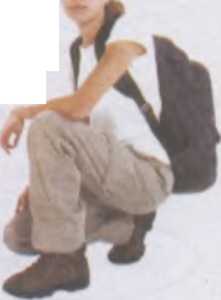 IVE
GOT A WHOLE NEW WAY OF LOOKING AT THE WORLD Natasha Anderson. 19, had
not planned to take a gap year this year. “I didn’t get the
grades I needed for university.
IVE
GOT A WHOLE NEW WAY OF LOOKING AT THE WORLD Natasha Anderson. 19, had
not planned to take a gap year this year. “I didn’t get the
grades I needed for university.
Ill take my exams again next June. At first. I didn't know what to do, but after a couple of months of doing nothing and feeling bad about myself, I contacted a gap year agency and now here I am, far from home.’
“I've been here for five weeks so far. I’ve been helping build a water system, working alongside professionals. We're based in a permanent tented camp, but for the last two weeks I've been staying in a small camp some distance from the main one. It’s all very exciting. Before I came here, I had just been sitting around watching daytime TV and getting bored.*
 'I’ve
learned so much while I’ve been here. For example, I’ve been
learning Spanish since I arrived, and that might be very useful for
me later. I’ve met so many interesting people. I've got to know the
locals and to understand their point of view. I realised how much of
what
I thought was true
was just the way my particular culture viewed the world. In fact.
I've now got a whole new way of looking at the world. Not only that.
I now feel much more confident about myself.*
'I’ve
learned so much while I’ve been here. For example, I’ve been
learning Spanish since I arrived, and that might be very useful for
me later. I’ve met so many interesting people. I've got to know the
locals and to understand their point of view. I realised how much of
what
I thought was true
was just the way my particular culture viewed the world. In fact.
I've now got a whole new way of looking at the world. Not only that.
I now feel much more confident about myself.*
(1 Speak on the reasons why some young people would like to study abroad. Use and complete the word map below.
 communicate
every ^ /experience a different
communicate
every ^ /experience a different
day in English у \ culture firsthand
go sightseeing
REASONS TO STUDY ABROAD
get a certificate
prepare for university^ f make friends from
in that country ^different countries
© Listen to the information about what each of the five English-
speaking countries has to offer for students who are thinking of going overseas to study and answer the following questions In no more than three words. Make notes if you need.
What type of university preparation course is available in the UK?
On which education system are New Zealand programmes founded?
Which two values are extremely important to Americans?
Which US educational programmes are two years in length?
Who concluded that Canada is one of the best countries in the world to live in?
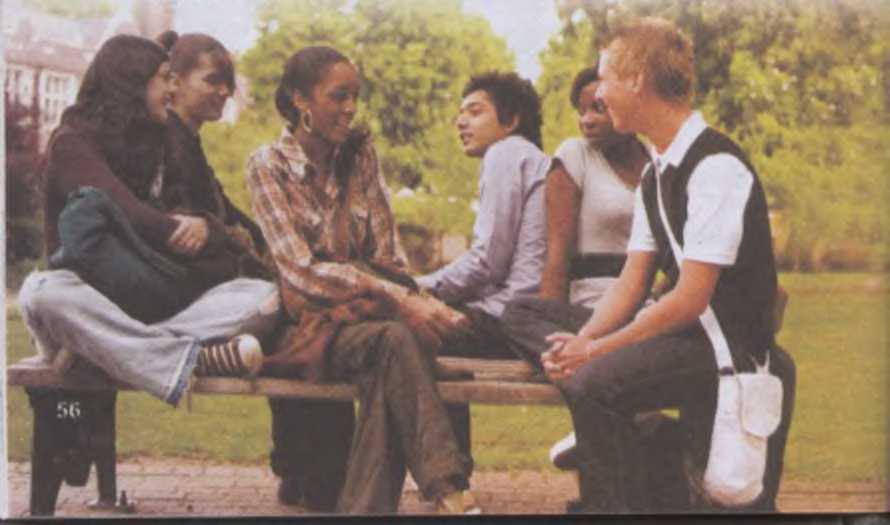
LISTENING
 Match
the words from the ‘Word File’ with their definitions (1-9).
Match
the words from the ‘Word File’ with their definitions (1-9).
... is known and admired by a lot of people, especially for some special skill, achievement, etc.
2
3
4
5
6
7
.
... is the nght to do what you want without being restricted by anyone ... is the freedom and the right to do whatever you want without being afraid of authority
... is a variety including a range of different people or things ... is someone who has completed a university degree course, especially for a first degree
WORD'
FILE
diversity [dai'v3:sati]
freedom
('fri:dam|
a
graduate [gra^uat] liberty ['liboti)
Montreal
[.montri'a:!]
Vancouver
[v®n'ku:va|
appealing
|a'pi:ligj
renowned
(n'naondj
foundation
course publicly funded • to be well regarded (in)![]()
... is funded by ordinary people in a country, who are not members of the government
is thought about in a good way
9
Listen to the information again and refer the following statements (1-5) to the appropriate countries.
AU (Australia)
CA (Canada)
NZ (New Zealand)
UK (United Kingdom)
US (United States)
1 There is an enormous choice of colleges and universities.
I 2 Some universities are famous for
courses in environmental studies.
□
It is well-known for producing many famous authors.Students should be able to think for themselves.
It is not a very expensive place to live in.
Tick (S) the statements below if they are true and agree with them.
1 Australia is a dangerous country.
|~~| 2 Most state universities in Australia are of comparable quality.
П 3 A degree from a UK university is highly regarded.
П 4 The British education system has a large practical element.
5 Canada has the top three universities in the world.
In pairs, speak on how people find information about jobs In Ukraine.
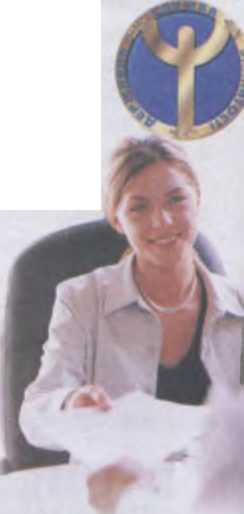 In
groups, discuss the questions below.
In
groups, discuss the questions below.
When were you able to give a definite answer about your future profession? Who helped you to make your choice?
Has your choice of profession been changed from time to time as you grew older? Why?
Do you think you'll have to change your mind after you finish school? What reasons could make you think about another profession?
What should a young boy (girl) do to be well suited for a chosen job?
Can you explain why new jobs are constantly appearing? What might be especially attractive in a new job?
In pairs, complete the dialogues with your own endings and dramatise them In class.
A 'Have you chosen your future profession?"
‘Strange as it may seem, I haven't yet.*
•Well, I think it is natural that you hesitate. There are so many
occupations, that it is not easy to decide.*
В “Have you heard the news?"
“What news?*
‘Nick has made up his mind to try to enter the teachers' college “
“Oh, my! It's unbelievable that he will become a teacher. He hates children.* С “There’s no doubt that she should become a doctor.’
"Why do you think so?*
“I’ve known her for many years as a very kind-hearted girl.
Besides, she comes from a doctor's family. For several generations they all have been doctors.*
Interview your classmates about their future jobs Use the questions below. Work in pairs.
Have they already made decisions?
Do they realise what they particularly enjoy about their jobs?
Do they know what they should leam and be good at in order to be successful In their jobs?
W
□ R D с
FILE
authorities
b:‘9ontizl an enterprise |'ent»praiz| legislation [.ledjis'leijnl
to assist (»'sist | to contribute (ken'tnbju:t| vocational
|vao*kei{anl|
be
engaged (In)
be
obliged (to)
5
Tffe»d the
newspaper article Than do the task below.
Prepare
and make a speech on the problem of jobs for young people In Ukraine
at a sitting of the International Friendship Club for your British
guests.
They
will have a lot of questions.
Be
ready to answer them. Work in two
teams:
the first group writes speech and decides who'll be the speaker, the
second
group
prepares and asks questions.
"
Ukrainian
legislation gives wide opportunities for vocational training and for
choosing a trade for all those who arc looking for employment: young
people who have left secondary school; young men after military
service; people who have left their jobs because they have moved;
housewives, etc.
The
local authorities are obliged to assist people engaged in such
activities. It stemmed, on the other hand, from the economic
reconstructing that took place after the Soviet Union had been
ruined. The other reason was that in recent years the crisis in
world economy led to the growth of unemployment.
As
a result, many enterprises are working only one shift instead of
three. Under the command-and- administrative methods of management
every official has extensive powers which he docs not want to lose.
However, the reorganisation opens up wide opportunities for those
who do wish to contribute to the economic restructuring and apply
themselves to real work.

![]()
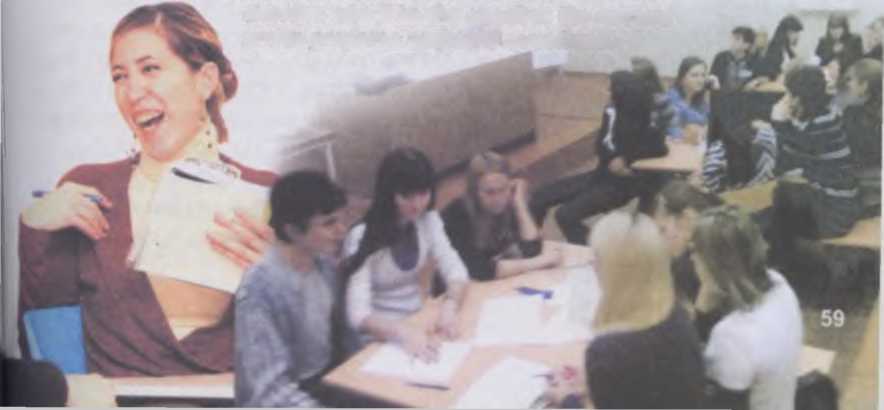
USE YD U R ENGLISH
Complete the sentences by changing the verbs in brackets into Future
Perfect or Future Perfect Continuous forms.
At the end of this semester, Max will have been studying (study) at university for two years.
... (you /have) dinner before you get here or should I prepare something for you to eat?
Saturday week, I... (go out with) Judy for two years.
You ... (drive) for over six hours soon. Why don't you stop for a rest?
If I get home very late, my mother... (worry; about me for several hours.
Don't call me after six as I... (leave) by then.
I'll be exhausted by the time I cross the finish line as I ... (run) for over four hours.
Choose the correct word to complete each sentence.
I don't think there's much (possibility I opportunity) for us choosing him
for the job.
I only wear this suit on special (occasions I opportunities).
Did you get a(n) (possibility I opportunity) to speak to Matt yesterday?
She’s just written to our company applying for a (work / job).
I'm a qualified engineer, so my aim is to find (work / job) in that field if I can.
(я
One of my (work I job) was to count the money at the end of the day
Fill in the gaps choosing the correct words from the list on page 61.
STARTING A BUSINESS Nearly 450,000 businesses are started in Britain (0) every year. One third (1)... these stops trading during the first three years.
 Starting
a business is never easy (2)... so many things are outside your
control. If you are thinking about working for yourself, you (3)...
start by thinking about the qualities you need to (4)... a business
Be hard with yourself. If you have a weakness, it is better to find
out now (5)... than later when your business could be in danger. Ask
yourself (6)...
you are a good organiser. Is your health (7)... ? Are you good (8)...
making decisions? Do you have any practical experience of the
business you want to start? Are you prepared to work long hours for
very (9)... money? If you can't (10)...
yes’ to most of these questions, perhaps you should think again
about starting up in business on your own.
Starting
a business is never easy (2)... so many things are outside your
control. If you are thinking about working for yourself, you (3)...
start by thinking about the qualities you need to (4)... a business
Be hard with yourself. If you have a weakness, it is better to find
out now (5)... than later when your business could be in danger. Ask
yourself (6)...
you are a good organiser. Is your health (7)... ? Are you good (8)...
making decisions? Do you have any practical experience of the
business you want to start? Are you prepared to work long hours for
very (9)... money? If you can't (10)...
yes’ to most of these questions, perhaps you should think again
about starting up in business on your own.
2 USE
YOUR ENGLISH
USE
YOUR ENGLISH
0
CjT)
every^>
b)
this
c)
last
d)
one
1
a)
from
b)of
c)
among
d)
in
2
a)
however
b)
but
c)
because
d)
although
3
a)have
b)
ought
c)need
d)
must
4
a)
run
b)
make
c)
do
d)
set
5
a)
more
b)
rather
c)
earlier
d)
quicker
6
a)
which
b)
how
c)
whether
d)
that
7
a)
fine
b)
firm
c)
well
d)
good
8
a)
at
b)for
c)
in
d)
with
9
a)
short
b)
little
c)
low
d)
few
10
a)
give
b)
report
c)
answer
d)
put
A)
a) Read and guess the jobs of the people (see pages 61-62).
m
%
s4
Andy
Speaker B:
When I tell people what my job is they say it must be very difficult and depressing but I don't think so. I think it's a wonderful job. People say that it must involve a lot of personal sacrifice, I mean, there are all sorts of things that you have to do that most people wouldnt like to do. but personally I don't see it this way at all. In fact. I think I'm being selfish, because I'm doing what I want to do. I've always liked helping others.
Linda
Speaker C:
Id
*
<
I
USE
YOUR ENGLISH
Speaker 0:
Ruth
 like
my job because I have a lot of contact with people. The thing is. I
like helping people, and I feel good when they go away with what
they want. I think you have to be friendly to do this job well.
Sometimes, of course. I meet people who are in a very bad mood, and
this depressed me at first. But later I've learned that the problem
isn't in me but in them. So I make an effort to be nice, and almost
always they are nice back and even leave with a smile on their
faces, which makes me feel good. I’d hate to be in a job where
you have to judge people or tell them what to do. I just like to
help.
like
my job because I have a lot of contact with people. The thing is. I
like helping people, and I feel good when they go away with what
they want. I think you have to be friendly to do this job well.
Sometimes, of course. I meet people who are in a very bad mood, and
this depressed me at first. But later I've learned that the problem
isn't in me but in them. So I make an effort to be nice, and almost
always they are nice back and even leave with a smile on their
faces, which makes me feel good. I’d hate to be in a job where
you have to judge people or tell them what to do. I just like to
help.
Speaker E:
Martin After
school, I went to university and studied economics and then got a
job in a large corporation. I stood it for a few years, but then I
quitted. I just didn't fit in. The trouble was that there I wasn't
good at being told what to do and how to do it. All around me were
procedures that I had to follow, and they often didn’t make sense.
I could often see a better way of doing things, but my boss wanted
me to stick to the procedures and not to break the rules. So I left
my job. and then made my hobby my career. The great thing about my
job is that I have to be creative. I see a piece of land, whether
part of an estate or a back yard in a city, and think how to make
the best of it in both practical and artistic terms, and although I
enjoy the company of people. I love the
After
school, I went to university and studied economics and then got a
job in a large corporation. I stood it for a few years, but then I
quitted. I just didn't fit in. The trouble was that there I wasn't
good at being told what to do and how to do it. All around me were
procedures that I had to follow, and they often didn’t make sense.
I could often see a better way of doing things, but my boss wanted
me to stick to the procedures and not to break the rules. So I left
my job. and then made my hobby my career. The great thing about my
job is that I have to be creative. I see a piece of land, whether
part of an estate or a back yard in a city, and think how to make
the best of it in both practical and artistic terms, and although I
enjoy the company of people. I love the
freedom of working on the land.
Match the people with their Jobs.
2
USE
YOUR ENGLISH
I
>
*
п
С
TJ
-<
□
с
я
I
£
о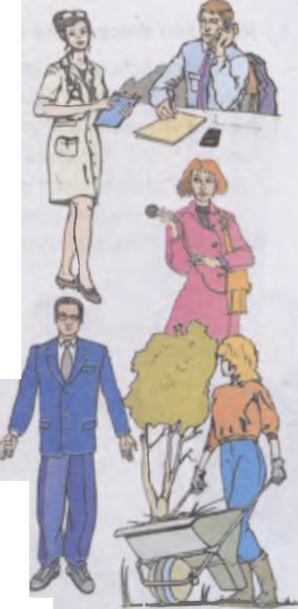
Linda 2 salesperson
Fred 3 landscape gardener
Ruth 4 hospice' nurse
Martin 5 journalist
Match the people with their personality
types. Then make notes on what they say to justify your answer. Work in pairs.
Andy 1 worried
Linda 2 living life to the full
Fred 3 nothing ventured1,
Ruth nothing gained
Martin 4 warm-hearted
reliable
In pairs, discuss the following questions.
Do you think the above people have the right personalities for their jobs?
How important do you think it is for people to have the right personalities for their jobs?
Role-play the situations (1, 2) In small groups.
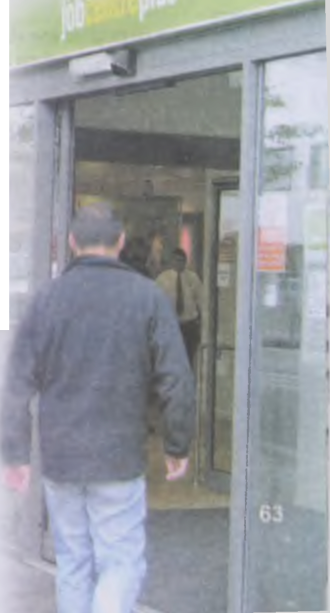 Your
older friend has just returned from the army. But he hasn't chosen a
trade for himself yet. A special job service for young people has
been opened recently in your town They consult young people about
the opportunities in getting jobs. Your friend asks you to go there
and find out everything for him.
Your
older friend has just returned from the army. But he hasn't chosen a
trade for himself yet. A special job service for young people has
been opened recently in your town They consult young people about
the opportunities in getting jobs. Your friend asks you to go there
and find out everything for him.
Go to the job centre and have a consultation about the opportunities for vocational training and choosing a trade. Find out if the local authorities are obliged to assist young people in finding a job.
Go back to your friend and tell him about your visit. Discuss all the opportunities together and choose a job for him.
USE YOUR ENGLISH
Read and discuss the questions in groups.
Leaving school and going on to higher education is an exciting thought. A university or college education has many attractions. A degree is still a must for many careers, and graduates tend to earn more than non-graduates. University life also gives you important experience as you leave home, mix with new people, learn to stand on your own two feet and broaden your
horizons. There are plenty of universities to choose from in Ukraine. Look at them and consider more practical questions like these ones.
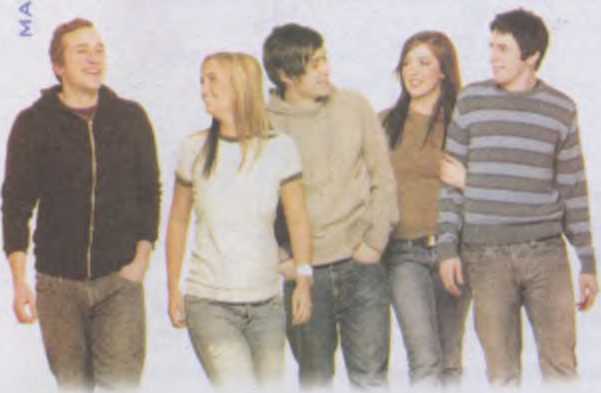 Oo
you want to live away from home?
Oo
you want to live away from home?Do you want to live on campus?
Are there societies which interest you?
What is the cost of living in different areas in Ukraine?
How quickly can you get home for weekends and holidays?
![]() Do
a group project. You are going to prepare a presentation.
Do
a group project. You are going to prepare a presentation.
Read the situation and follow the items below.
TAKING A GAP YEAR IN UKRAINE
You're going to attend an International Youth Action Conference that
includes a section on gap years. You have been asked to present Ukraine.
 In
your group, prepare a short presentation.
In
your group, prepare a short presentation.
Your presentation should include:
the present attitude among young people in Ukraine towards taking a gap year;
the present opportunities for young people in Ukraine to have a gap year-type experience;
your view on the advantages and disadvantages for Ukrainian students of taking a gap year;
recommendations on what action, if any, should be taken in Ukraine concerning gap years.
Make sure that your presentation has: a An Introduction in which you say:
2
USE YOUR ENGLISH
I
>
*
n
с
X
<
□
с
л
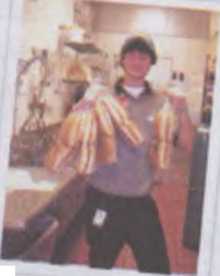 what
the issue is
what
the issue is
what your purpose is:
%
What I want to do (today / this morning) is to My purpose / aim (today / this morning) is to .
what your topic is:
I'm going to talk about...
z
о
what points you will cover:
My presentation will be in 3 parts.
First I'll talk about / deal with ...
Then /Next / Secondly. Ill consider/deal with ...
Thirdly /Finally. Ill...
when the listener can ask questions:
If you have any questions, please feel free to interrupt me.
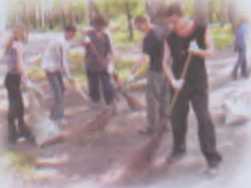 Finally.
I'd be glad to answer any questions you may
/
might
have
Finally.
I'd be glad to answer any questions you may
/
might
have
b A clear signal at the start of the Body of the presentation:
Let me begin with ...
Now if we turn to ...
Let's deal next with ... + topic This brings me to ...
would like to go on to ... с A clear summary / conclusion at the end of each part of the Body of the presentation, in which you restate your main point:
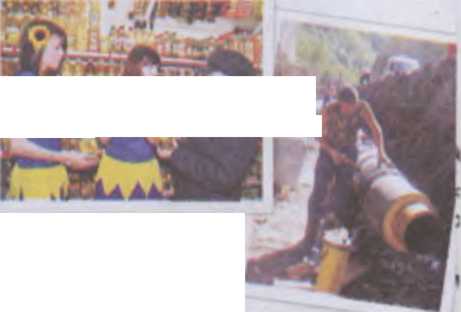 To
summarise. ...
To
summarise. ...
To conclude/In conclusion ... d A Conclusion in which you:
repeat your main points 1 •'
give your main conclusion e An Ending:
Well, that's all I have to say.
Thank you for your attention.
If you have any questions. Ill do my best to answer them.
Give your presentation to the class and answer any questions the class might have.
1
Refresh
your knowledge on application letters. Compare the structures of
two types of application and find out the difference between them.
Work in pairs.
A
JOB A COURSE
FORMAL GREETING
